When it comes to vacations and saving our oceans we should all be in the same boat. As the underwater filmmaker Jacques Cousteau said: ‘The sea, the great unifer, is man’s only hope.’
After all, water covers more than two-thirds of the Earth’s surface. It regulates our climate and generates seven out of every ten breaths we take, thanks to microscopic phytoplankton which absorb carbon dioxide and produce 70 per cent of the world’s oxygen. That’s more than double the amount created by the rainforests, which make up just 28 per cent.
As well as soaking up the heat, our oceans transport warm water to the poles from the equator, and cold water from the poles to the tropics, ensuring the weather isn’t so extreme in some regions that it makes them inhabitable. The sea holds 97 per cent of the planet’s water, regulating rain and droughts.
But the climate crisis is warming the oceans, which are losing oxygen and its PH has been decreasing. As sea temperatures rise, marine life change their geography and depth ranges, but not all species can do this, causing them to die.
Without the sea we – and the hundreds of thousands of species that live in the deep waters – can’t survive.
World leaders recently made a global commitment to protect 30 per cent of our blue planet by 2030, but we need to do more.
And as the ocean surrounds many of the dream destinations we travel to – and sail on, as well as swim and dive in! – why not go on a sustainable vacation to places that pioneer marine conservation?
From coral planting at Baros Maldives to turtle conservation at Miavana By Time + Tide, these vacations are perfect for eco travellers who want to sea-s the day!
Baros Maldives
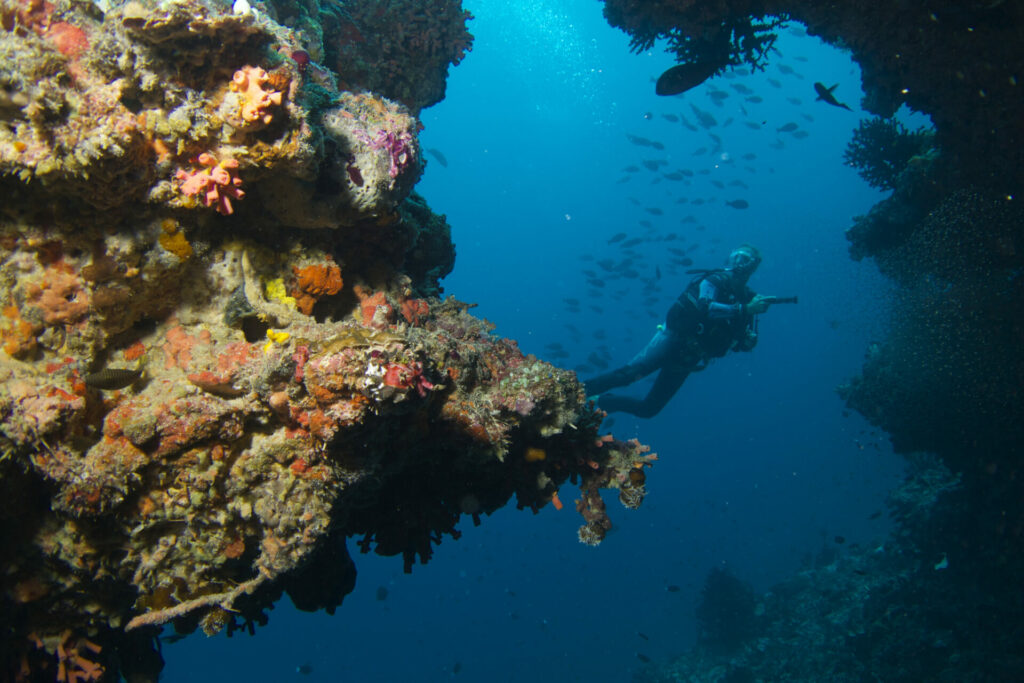
Since opening in 1973, Baros Maldives has been a leader in green initiatives, making it one of the pioneer eco-friendly resorts in the Maldives. As part of its upcoming 50th-anniversary celebrations in December, the resort has launched a new online hub, aimed at raising awareness about the fragile marine environment in which its underwater world resides. Here, guests can find anecdotes from the ‘Baros Underwater Ambassadors,’ who have shared their favourite underwater stories from their vacations that showcase the island resort’s ecological initiatives.
Guests can also aid in restoring the coral reef through the ‘Eco Explorer’ programme. Led by the resident marine biologist, the programme includes a coral frame planting experience in the coral garden where guests will plant living coral fragments directly on the reef, with the goal of afforesting areas damaged by crashing waves and weather events.
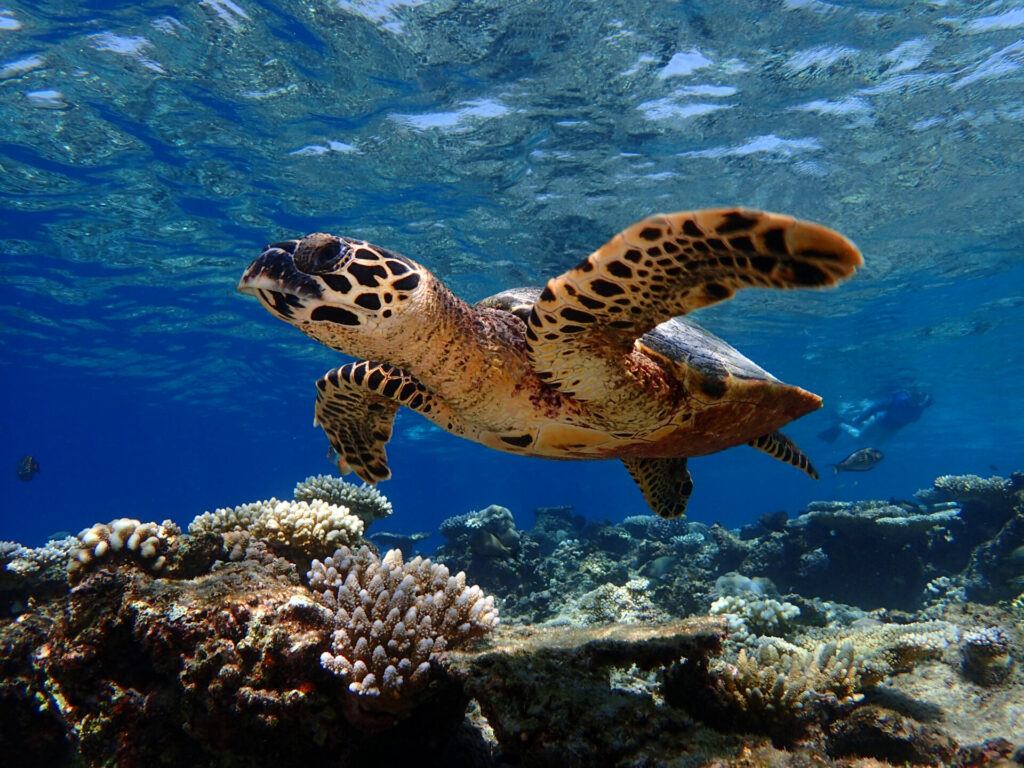
A deeper understanding of the complex underwater world can also be developed through a private snorkelling and fish identification session.
Staying There
Baros Maldives is situated in the central southern part of North Malé Atoll, just 25 minutes by speedboat from Maldives International Airport. Rates at Baros Maldives start from $675 (approx. £464) per night in a Deluxe Villa on a B&B basis, excluding taxes. www.baros.com
Jumby Bay Island
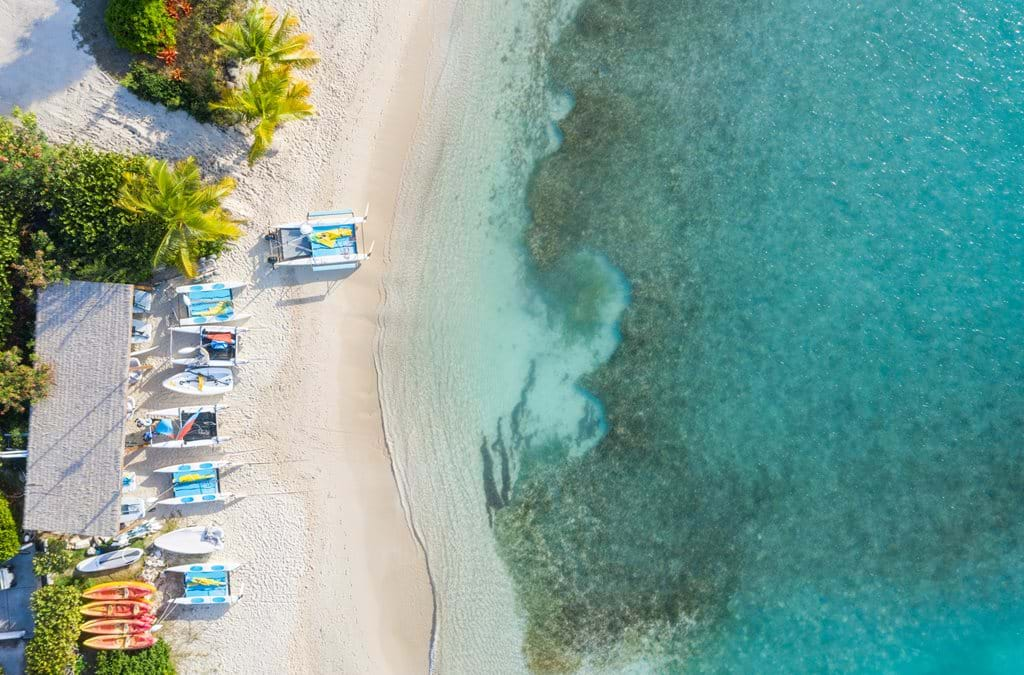
Set in one of the most beautiful untouched locations in the world, Jumby Bay Island is a private island just two miles off the coast of mainland Antigua.
Ringed with coral reefs and reachable only by boat, the private isle comprises three stunning white-powdered beaches. In an effort to preserve and showcase its natural beauty, Jumby Bay Island remains staunchly devoted to its sustainability program, carrying out several initiatives that preserve its environment and indigenous species – the endangered Hawksbill Turtle, the White Egret, and the Persian Black-Headed Sheep.
Jumby Bay Island is home to the Jumby Bay Hawksbill Turtle Project – the longest running privately funded project of its kind. As the beaches of the island have long been a haven for nesting Hawksbills, the program focuses on the scientific study of the species and works to ensure their survival and recovery. Every night from June to November, discerning guests on vacation can immerse themselves in the conservation efforts by joining the researchers to see the turtles lay their eggs.
Staying There:
All-inclusive rates for Jumby Bay Island start from $2,295 per suite, per night + service and tax, inclusive of all meals, beverages, cocktails and house wine by the glass, as well as all watersports activities and kids’ club. www.oetkercollection.com/hotels/jumby-bay-island
Bawah Reserve
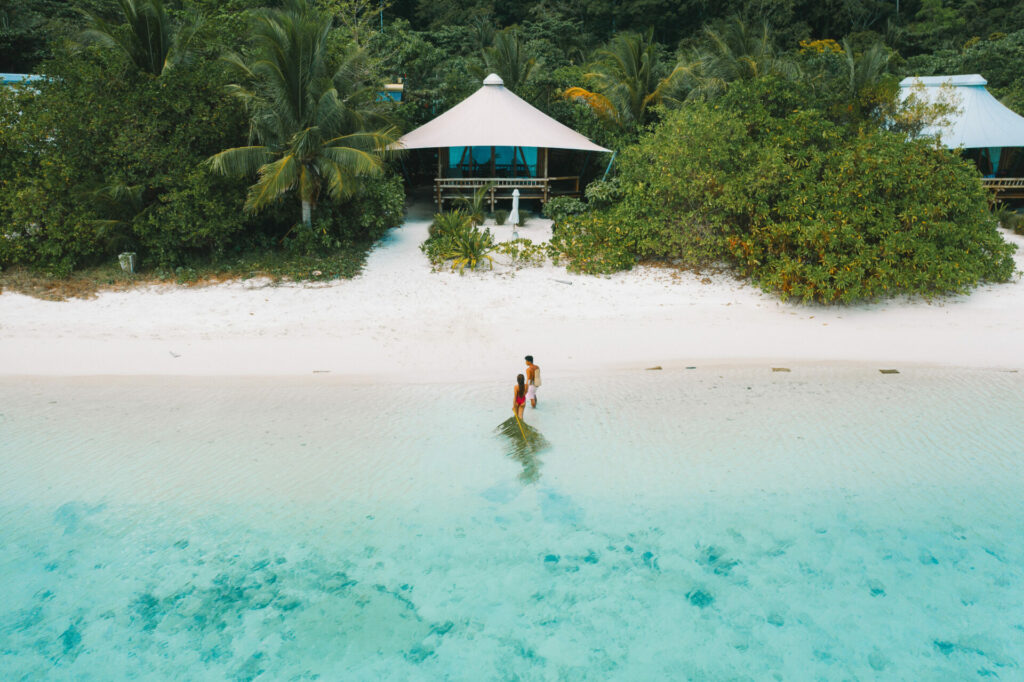
This natural reserve, located in Indonesia’s remote and lesser travelled Anambas Islands, was created and developed with an earth-first philosophy, centered around the pristine nature that can be found on this group of six islands, 13 beaches, three lagoons and 100 hectares of forest.
Bawah is the first island in Indonesia to be powered by a renewable microgrid and is certified as a 5-star resort under the Singing Blue WWF programme. The property is part of the Anambas Foundation, created to channel funds back into the local community.
Bawah Reserve is committed to elevating the welfare of the Anambas people. Local labour was used to build the Reserve and 23 per cent of the employees today come from the Anambas Islands, while 98 per cent of their overall employees come from Indonesia. When it comes to the gastronomic experiences, the property’s own permaculture vegetable and herb gardens supply around 40 per cent of the restaurant’s produce for guests on vacation.
Bawah has installed Swimsol’s innovative and patented SolarSea system. The state-of-the-art setup comprises 18 floating solar platforms, enough to provide the majority of the Reserve’s total energy needs.
An ‘ECOmmittee’ meets monthly to create green initiatives: making eco bamboo bins; organising weekly beach clean-ups; and engaging in turtle conservation are just some of the many projects to come from this. To positively contribute to the local community, Bawah Reserve is continually committed to providing employment, economic opportunities, and sustainable eco-awareness education by identifying with the local culture, fostering strong local community relationships, and holding a deep respect for local traditions and customs.
Staying There:
Rates at Bawah Reserve start from $1,980 USD per night for two people on vacation on a full board basis including spa daily treatments, laundry, in-room minibar, and a host of land and water-based activities. www.bawahreserve.com
Miavana By Time+ Tide
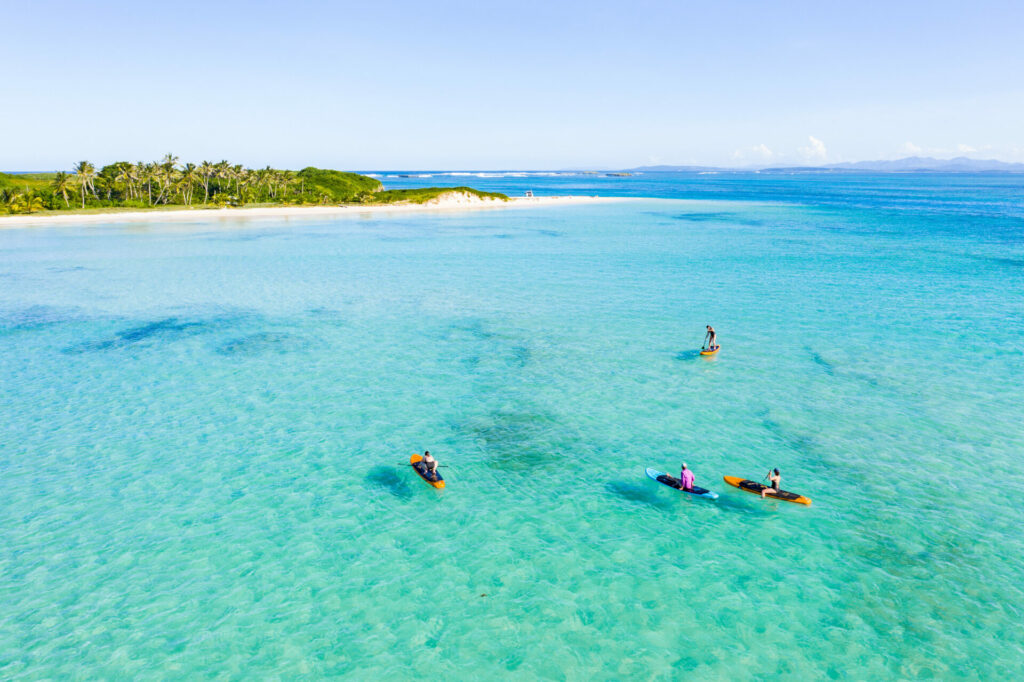
This private-island hotel, located on Nosy Ankao, off the north-east of Madagascar, has a deep and genuine commitment to the environment and its neighbouring communities. With their conservation heritage dating back to 1950, Miavana by Time + Tide is uniquely positioned on a protected 2,500-acre island with a full-time environmental team trained in wildlife monitoring and reforestation, meaning that with the support of the Time + Tide Foundation, they have the opportunity to take a more hands-on approach to conservation on the island.
So far that has included turtle conservation, which includes daily patrols of the island’s beaches to mark nests, to give hatchlings the best chance at survival.
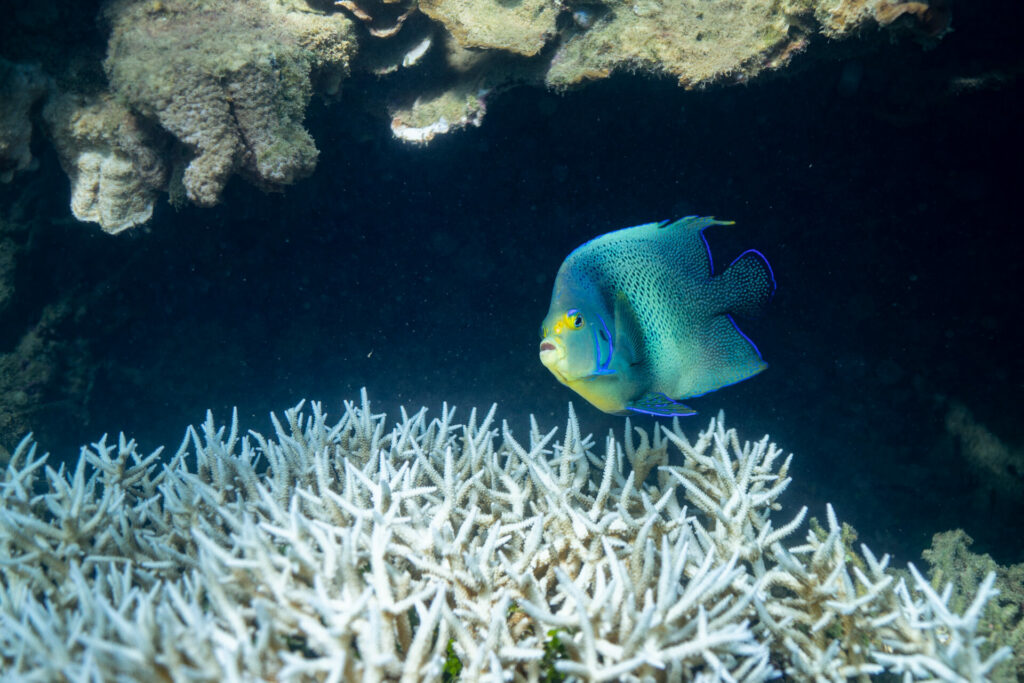
In order to protect the vast marine life that surrounds the island and the Loky-Manambato region, the Time + Tide Foundation works closely with the local fishing federation and FANAMBY. Together they ensure that the communities of the area are constantly re-educated on the disastrous effects of illegal fishing, as well as the methods on the marine environments that these same communities depend on for life. By visiting these communities and sharing their knowledge, teaches better approach to marine life and sourcing sustainably.
As Terns play a vital role in marine ecosystems, the Time + Tide Foundation works hard to ensure that the period in which they nest on the island of Manampaho, is as efficient as possible.
In order to do this, they make frequent visits to the island which include a clean-up to rid the nesting area of any foreign debris. In addition, the team also ensures that there are no fishermen or campers on vacation on the island as they may influence the terns to not nest on the island, or even attempt to collect their eggs.
Staying There:
Rates at Miavana by Time + Tide start from $3,000 per adult per night in a one-bedroom villa on a full board basis. The rate excludes conservation, foundation and access fees which are charged at $300 per person per night. www.timeandtidefoundation.org
Islas Secas, Panama
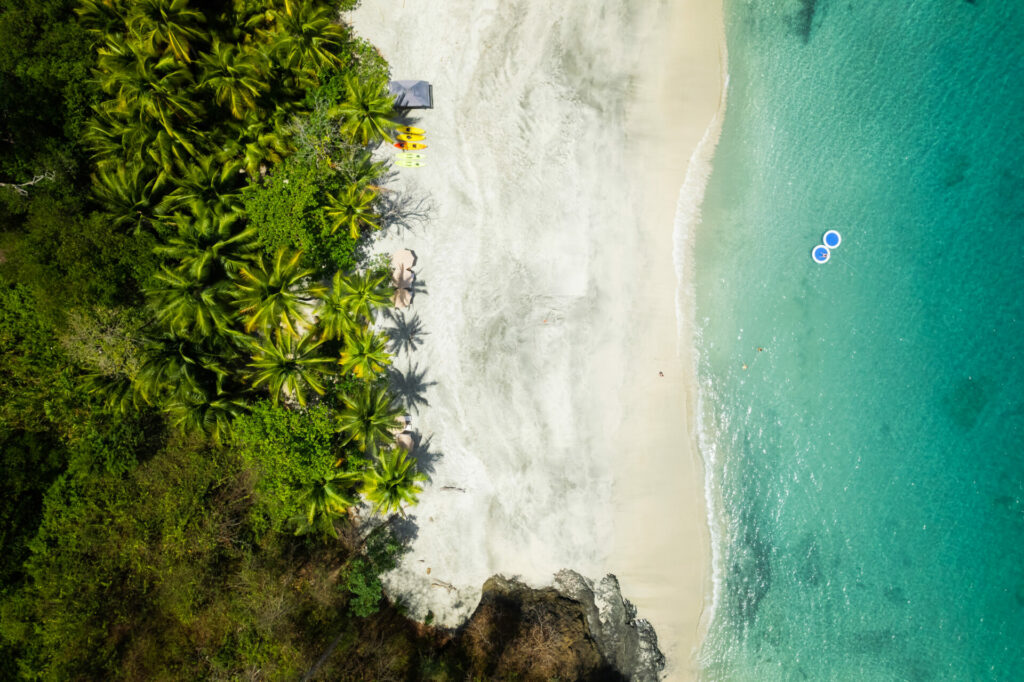
Located off Panama’s rugged Pacific coast, the privately-owned Islas Secas offers endless opportunities for sustainable adventure on vacation.
A few hours west of Panama City, the Gulf of Chiriquí lies along Panama’s Pacific coast, extending from the Costa Rican border to the west and to the Azuero Peninsula on the east.
This region is home to the largest coral reefs off Panama’s Pacific coast, beautiful beaches and two vast, protected marine parks. Teeming with exceptional sea life, thousands of species of wild fauna and flora and a little-touched, Jurassic Park-style setting, this is one of Central America’s best-kept secrets, far less explored than its Caribbean cousin.
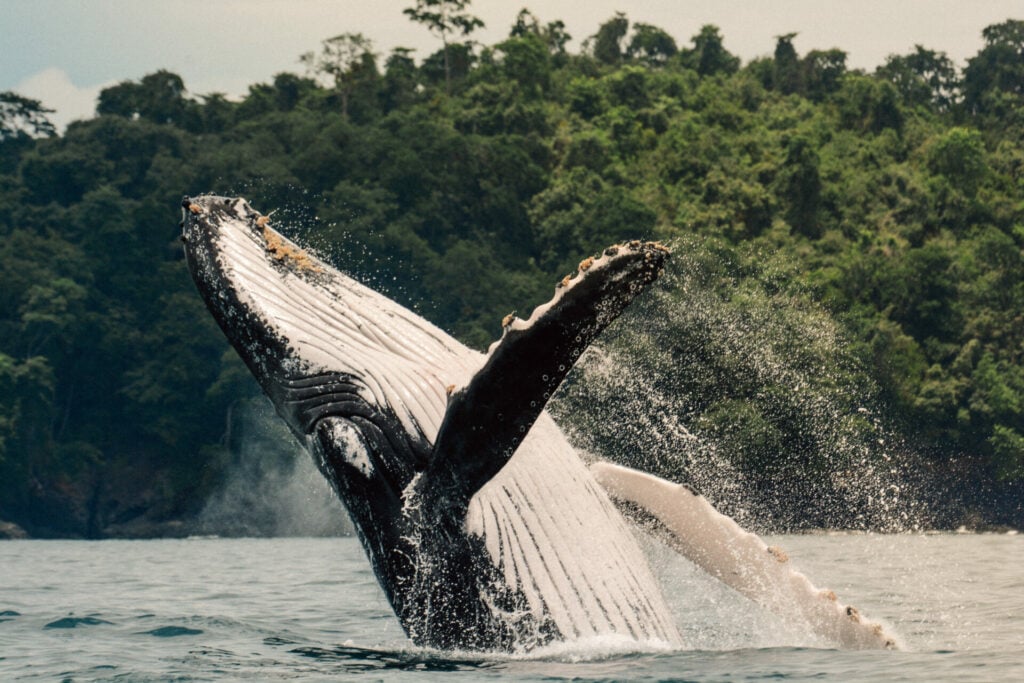
The 20 miles between Islas Secas and the coast of mainland Panama allow endless opportunities to explore the vibrant waters of the Gulf on vacation, creating an untouched ‘marine playground’ for guests.
For the eco-conscious traveller, Islas Secas impresses with strong sustainability credentials: in harmony with its surrounding environment, it is considered an environmentally preserved protected area under Panamanian law.
Sustainability efforts include 100 per cent of energy consumption on island powered by a 300-meter solar array; 100 per cent of guests’ water use captured and reclaimed through a filtration system to provide surface irrigation and reduce impact on groundwater supply; and 100 per cent of food scraps dehydrated and used for composting as fertilizer.
The resort has also removed invasive species and planted thousands of native Panamanian trees to help restore the natural infrastructure and integrity of the islands. Protecting Panama’s precious natural heritage is a driving force at Islas Secas, and the resort has expanded that ethos to support local community projects in the Chiriquí region. The privately funded Islas Secas Foundation partners with conservation organizations, including Panama Audubon Society, MarViva, and Panacetacea to support efforts from mangrove restoration to marine area protection as well as environmental education in Chiriqui.
Staying There:
Rates at Islas Secas start from $2,500 per night (currently approx. £2,019) on an all-inclusive basis, including all F&B, one spa treatment per guest/per stay, and a variety of activities on and off-island. islassecas.com









